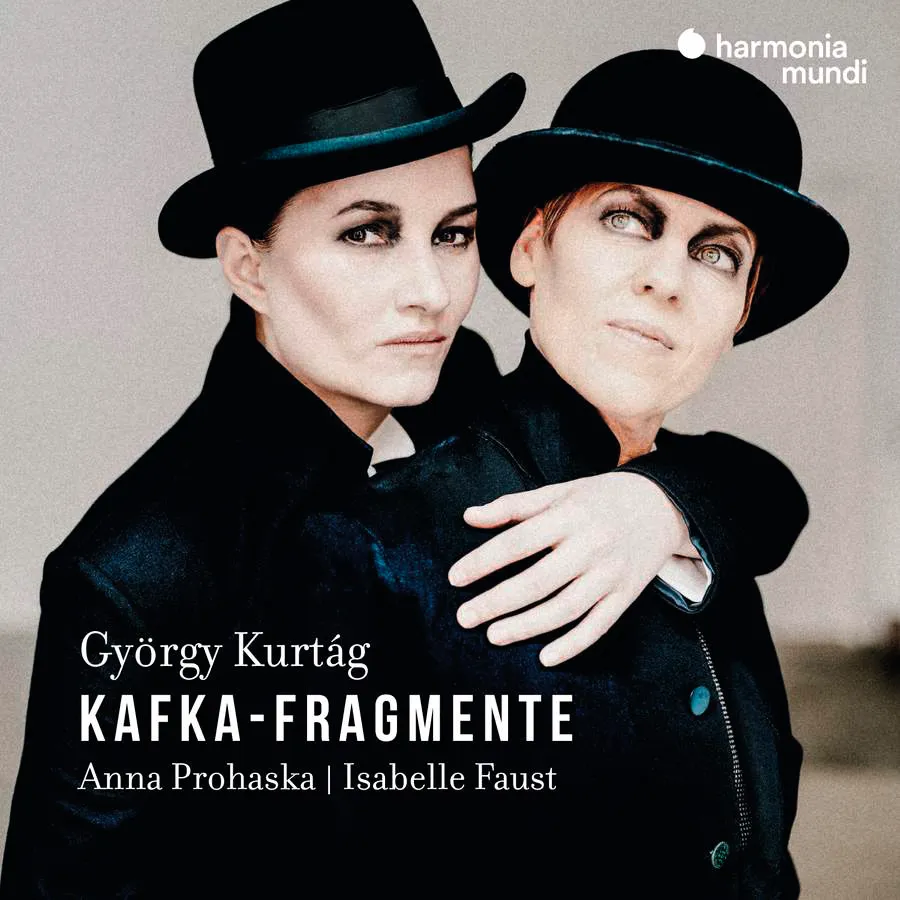
György Kurtág Kafka-Fragmente Anna Prohaska (soprano), Isabelle Faust (violin) Harmonia Mundi HMM902359 58:06 mins
Begun in 1985 and premiered two years later, György Kurtág’s Kafka-derived miniatures occupy that happy meeting place where words and music seem almost to have been made for each other. His interest in the Czech writer had been rekindled during study in Paris towards the end of the 1950s, and that stay had turned his musical world upside down. Suddenly the whole landscape of the Western avant-garde opened up before him, and Kurtág’s increasingly economical sensibility would chime with the compressed epiphanies to be found in the aphoristic jottings he culled from Kafka’s letters, diaries and notebooks. Just a few words are able to convey a sense of understanding awakened, and of the universality of the commonplace. Fragmentary, too, are the means with which Kurtág chooses to embed them: a voice and solo violin.
There’s no shortage of good recordings in the catalogue, but this new one might well be the best yet, eclipsing even the fine BIS account from Caroline Melzer and Nurit Stark, or Juliane Banse and András Keller on ECM. It goes without saying that the work requires a soprano of fearless technique who is also a singing actress to her fingertips, and a violinist with virtuosity to spare. But it’s not enough to perform the Kafke-Fragmente. They have to be lived – and sometimes conveyed in a mere instant. Whereas Webern’s miniatures seem to be contained within their length, Kurtág’s so often strive to push beyond the containment, creating huge worlds within the space of a few seconds. ‘Es zupfte mich jemand am Kleid’ (Someone tugged at my Clothes) notches up a blink-and-you-miss-it 13 seconds. Except you don’t blink; nor miss anything. ‘Verstecke’ (Hiding Places) and ‘Ruhelos’ (Restless), stretch to a positively expansive 24 seconds each.
That’s partly down to Kurtág’s fastidious precision – whether evoking the rustle of leaves in ‘Wie ein Weg im Herbst’ (Like a Path in Autumn), or skewering the conflicting, ennui-fuelled emotions of ‘Sonntag den 19 Juli, 1910’ (Sunday 19 July, 1910). But it’s also testament to the consummate chemistry between Anna Prohaska and Isabelle Faust. Across the whole cycle their intuitive rapport never falters, and, feeding off each other, the sparks they generate meld the fragments into something greater than the sum of their parts.
Prohaska floats the hushed rapture of ‘Berceuse 1’ with a bell-like purity and poise yet rises to the deranged squawking of ‘Nichts dergleichen’ (Nothing of the kind) with unbridled gusto. A sultry languor pervades ‘Träumend hing die Blume’, (The Flower Hung Dreamily), while ‘Szene in der Elektrischen’, (Scene in the Tram) is aquiver with vivid storytelling – Faust, given her head, positively runs with it. There’s wit, eroticism and disarming charm in abundance. Passion too. But not quite everything is writ small. The second of the four sections comprises a single fragment, a seven-minute ‘hommage-message à Pierre Boulez’ that weaves a skein of affecting gravitas; and the final number, ‘Es blendete uns die Mondnacht’ (The Moonlit Night Dazzles Us), signs off with extended silvery moonbathing and the slither of snakes. Kurtág is never an easy listen, but in a disc as indispensable as this, he’s an essential one.
Paul Riley